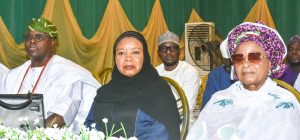
The Chairman of the House Committee on Police Affairs, Hon. Makki Abubakar Yalleman, says the Nigeria Police Force can no longer afford to sideline women if it hopes to deliver effective, modern policing to Nigerians.
Yalleman stated this on Monday during a public hearing on a Bill seeking to amend the Nigeria Police Act to mandate that at least 15 percent of new recruits must be women, alongside broader gender-sensitive reforms across the Force.
The amendment proposes a gender-responsive compliance system that would shape recruitment, training, deployment, disciplinary procedures, and marital policies. It also seeks the creation of a monitoring unit to track compliance.
According to Yalleman, increasing female participation in the Police is not a symbolic gesture but a practical necessity, especially for addressing domestic violence, sexual offences, and other crimes that disproportionately affect women and children.
“This Bill aims to raise female recruitment to a minimum of 15 percent and create an environment where women can thrive,” he stated, adding that the initiative aligns with the Legislative Agenda of the 10th Assembly led by Speaker Tajudeen Abbas.
The Ministry of Police Affairs declared full support for the Bill. Represented by Okorie Kalu from its Legal Unit, the Ministry described the proposal as both “timely and commendable,” noting that it has already begun reviewing discriminatory policies, including those tied to pregnancy or marital status.
Kalu said the Ministry is pursuing a comprehensive gender reform package involving fair training and postings, review of dress codes, maternity leave provisions, and the establishment of a Women and Children Protection Centre under the Inspector-General of Police.
He, however, stressed that proper funding and continuous capacity-building will be crucial for full implementation.
The hearing drew participants from civil society, women’s rights organisations, security experts, and senior police officers, many of whom described the Bill as essential to improving accountability and modernizing policing.
Speaker Abbas Tajudeen, represented by Hon. Nnamdi Ezechi, said the push for more women in the Police is rooted in justice, fairness, and the need to enhance overall policing performance. He lamented the long-standing underrepresentation of women in leadership positions within the Force, calling it a loss for the country.
“At its core, this Bill reflects our commitment to justice and underscores the fact that diversity strengthens policing,” Abbas said. “By broadening women’s participation, we are advancing equality, professionalism, accountability, and public trust.”
He highlighted global research showing that police forces with higher female representation tend to record lower rates of excessive force, respond more effectively to gender-based violence, and enjoy greater trust from citizens.
The Speaker noted that the proposal aligns with Nigeria’s Constitution and its international obligations, including CEDAW and the Sustainable Development Goals, especially SDG 5.
But Abbas cautioned that progress cannot rely on legislation alone, emphasizing the need for strong enforcement and monitoring systems.
“This Bill sets up a dedicated unit within the Police to track compliance and measure outcomes,” he explained. “It ensures that our intentions do not end on paper.”
Abbas urged all stakeholders, government institutions, civil society, and advocacy groups, to collaborate in driving the reform forward.
“This is not about apportioning blame but about moving the country forward together,” he added, commending the Committee and the Bill sponsor for prioritizing gender inclusion in national institutions.
Reiterating its support, the Ministry of Police Affairs noted that its submission to the hearing was personally approved by the Permanent Secretary due to the significance of the issue.
Kalu stated that the Bill reinforces ongoing reforms, including the integration of the NPF Gender Policy into policing operations, the introduction of maternity leave and religious accommodations, creation of grievance channels, and restructuring of the Inspector-General’s office to include units for women and children protection, human rights, and internal affairs.
He stressed that the amendment will provide the legal backbone needed to sustain these reforms and called for dedicated funding, regular training on gender issues, and strengthened monitoring through the Ministry’s Planning, Research, and Statistics Department.
Reaffirming his personal support, he added:
“Anything that enhances women’s visibility and responsiveness, we will support, not only in the Police but across all sectors. My mother, wife, sisters, and daughters are women, so why not? This will make them happy.”
Kalu thanked the Committee for its commitment and urged continued partnership in building a more inclusive Nigeria Police Force.




I wanted to take a moment to commend you on the outstanding quality of your blog. Your dedication to excellence is evident in every aspect of your writing. Truly impressive!
I really like reading a post that can make men and women think.
Also, thank you for permitting me to comment!
ارائه خدمات حرفه ای مخصوص احراز هویت و وریفای صرافی های بایننس و بای بیت و کوین بیس و اوکی ایکس و کراکن با مدارک معتبر توسط شوپی ویژه ایرانیان
به جز زیبایی ظاهری، چیزی که من رو شگفتزده کرد جزئیات امنیتی کارت بود. گرافیسو در خدمات آیدی کارت امارات (دوبی) واقعاً استانداردها رو رعایت میکنه. کارت چاپ برجسته، QR اختصاصی و حتی انعکاس نور زیر هولوگرام دقیقاً مثل نسخه دولتیه. تجربهای کاملاً حرفهای بود.
هزینه رپورتاژهای خبری خیلی بالا رفته و نمیشه برای هر کلمهای هزینه سنگین کرد. بهترین جایگزین ارزان و موثر، رپورتاژ در فرومهاست. من با هزینه یک دهم رپورتاژ خبری، ۵۰ تا لینک دائمی از ادزنو گرفتم و تاثیرش روی کلمات لانگتیل (Long-tail) عالی بود. برای مدیریت بودجه سئو، حتماً نگاهی به خرید بک لینک ارزان فرومی در سایت ادزنو بندازید.